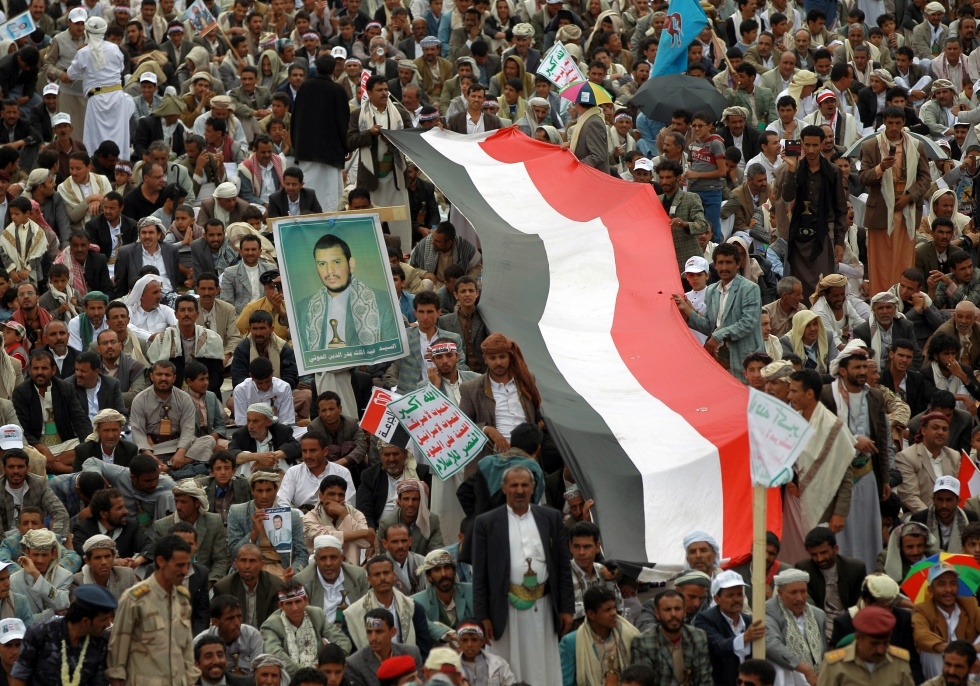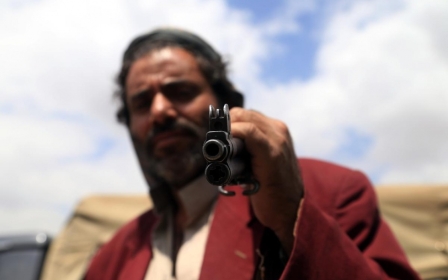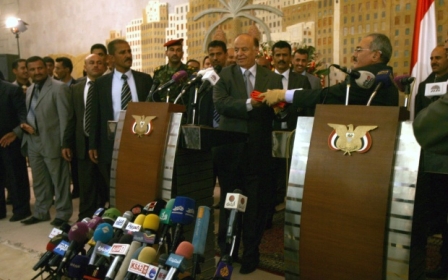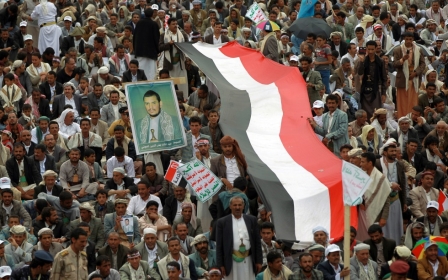Was the UAE behind the Houthi takeover of Sana'a?

Three days after Shiite rebels took hold of Yemen’s capital Sana'a last week, President Abd-Rabbuh Mansur Hadi, accused outside powers of staging an attempted coup.
“I understand that you all feel shocked,” said Hadi in an emotional address to members of parliament gathered in his presidential palace. “You have to know that the conspiracy is beyond any imagination. We were stabbed and we were betrayed from inside Yemen and outside.
“It is a cross-border plot where many forces allied together,” he added.
Hadi’s allegation of outside meddling appeared to be a veiled reference to Iran, which he has accused in the past of arming and supporting the Houthis, an allegation the group denies.
But a source close to the president, who left the capital shortly before it fell to the rebels, offered a different interpretation of Hadi's speech.
The source revealed to the Middle East Eye details of what they claim is a systematic attempt by Yemen’s former president Ali Abdullah Saleh and his son Ahmed Ali Saleh, the ambassador to the United Arab Emirates, to derail Yemen’s transition and vanquish his domestic opponents.
By using Saleh’s clout among tribal leaders and army chiefs, the plan, the source said, was to allow the Houthis to go on a rampage in north Yemen. While Saleh fought the rebel group for years when he was president, he now strove to allow them to seize the capital and eventually dismantle the Islah party, Yemen’s branch of the Muslim Brotherhood that is part of the current unity government.
The go-between for the operation was Ahmed Ali Saleh, the son of former President Saleh, who it was widely believed was being groomed for the presidency before his father was deposed in 2011.
The funding and planning, the source said, came from the United Arab Emirates, an ally of Saudi Arabia who has backed the coup to oust the Muslim Brotherhood in Egypt and who now fund President Abdel Fattah al-Sisi.
“The UAE started this two years ago,” the source said. “Saleh was given $1bn to be distributed to Houthi militias, tribes and media organisations. Their plan was to capture major military camps as well as TV and radio stations,” said the source.
In August, a secret Emirati delegation met Saleh along with two prominent Houthis, Saleh Habreh and Mohamed Muftah, at his residence in the capital, the source said.
Mahdi Maqola, a general loyal to Saleh who headed up the former president’s elite private guard and was dismissed by president Hadi in 2012 also attended the meeting.
“The Houthis were told that if they advanced militarily toward the capital they would receive support from tribes loyal to Saleh and they did,” said the source. “The reason areas north of Sana’a fell so quickly was because fighters from Sanhan and Bilad al-Rus, [Saleh strongholds] mobilised and persuaded locals to cooperate with the Houthis.
“That was how they took Amran,” said the source, referring to a city north of the capital that fell to the Houthis in July a little more than a month before the rebels seized control of Sana’a in September.
Houthi forces entered the capital in large numbers on 18 September and began occupying key ministries after a month-long protest in the city. A peace deal with the government, promising to appoint a new prime minister and to address some key economic concerns, was then signed on 21 September.
Two weeks before the capital fell, the source claimed president Hadi received a phone call from the UAE telling him to distance himself from Islah.
“This [the Houthi advance] happened after the refusal of the current president to remove the Muslim Brotherhood from power completely. When Hadi did that they put their plan into place,” said the source.
According to the source, the Houthis were given a “hit-list” featuring the name and addresses, as well as names of relatives, of prominent figures in the opposition.
“It was not a coup but a very organised plan to control the city, and eradicate Saleh’s opponents,” said the source.
On the day that the peace deal was signed, the Houthis carried out systematic attacks against several of Saleh’s opponents, many allied with Islah.
Ali Mohsen al-Ahmar, a major general who abandoned Saleh during the 2011 uprising, fled into hiding after the Houthis stormed and occupied his house. The rebels stormed the Islah TV-owned network al-Souhail and entered the houses of Islah leaders. The house of Ali Abdullah Saleh, who waged a war against the Houthis while president, was not attacked.
The UAE earlier this year announced its support for neighbouring Saudi Arabia’s decision to label the Muslim Brotherhood a terrorist organisation.
A diplomat involved in negotiations between the Houthis and the Yemini government who spoke to Middle East Eye on condition of anonymity said he had seen no evidence that linked the United Arab Emirates to the Houthi assault but that, “there was no doubt whatsoever that Saleh loyalists had mobilised thousands to help Houthi fighters in order to take revenge on their opponents - which they have succeeded in doing.”
Saleh’s supporters maintain he is minding his own business and blame the impasse on president Hadi, who they say is concentrating power and ruling by individuals rather than by institutions.
“People are using Saleh as a scapegoat. You can’t blame him for all of Yemen’s problems,” Abdul al-Janadi, Yemen’s deputy information minister, who remains close to the former president, told Middle East Eye when asked about the accusation against the former president.
“Saleh is a loyal man, he has Yemen’s best interests at heart,” he added.
A Yemeni diplomat in Washington DC also refuted allegations of UAE involvement.
“Look at [things] this way: would the UAE - which has over the past three years been one of Saudi Arabia’s closest allies - finance a group that will back the Houthis, who Saudi Arabia labels as terrorists?” said the diplomat.
Analysts similarly said that the United Arab Emirates was unlikely to interfere in Yemen without prior approval from Saudi Arabia.
“The Emiratis would never dabble in the Saudi backyard without their assent; Saudi would consider that hostile action,” said Abdul-Ghani al-Iryani, a Yemeni political analyst.
Iryani added the Houthi’s swift advance had probably benefited from Saleh support but that Yemen’s weak state, riddled with defunct institutions, was to blame for the rise of the rebels.
“Hadi inherited a state in suspended animation; a dead state,” said Iryani. “Saleh used informal networks of patronage to make things happen. When Hadi came to power he inherited institutions but not the patronage. The state was paralysed, his ability to make things happen was greatly reduced.”
Additional reporting by Tom Finn
New MEE newsletter: Jerusalem Dispatch
Sign up to get the latest insights and analysis on Israel-Palestine, alongside Turkey Unpacked and other MEE newsletters
Middle East Eye delivers independent and unrivalled coverage and analysis of the Middle East, North Africa and beyond. To learn more about republishing this content and the associated fees, please fill out this form. More about MEE can be found here.




